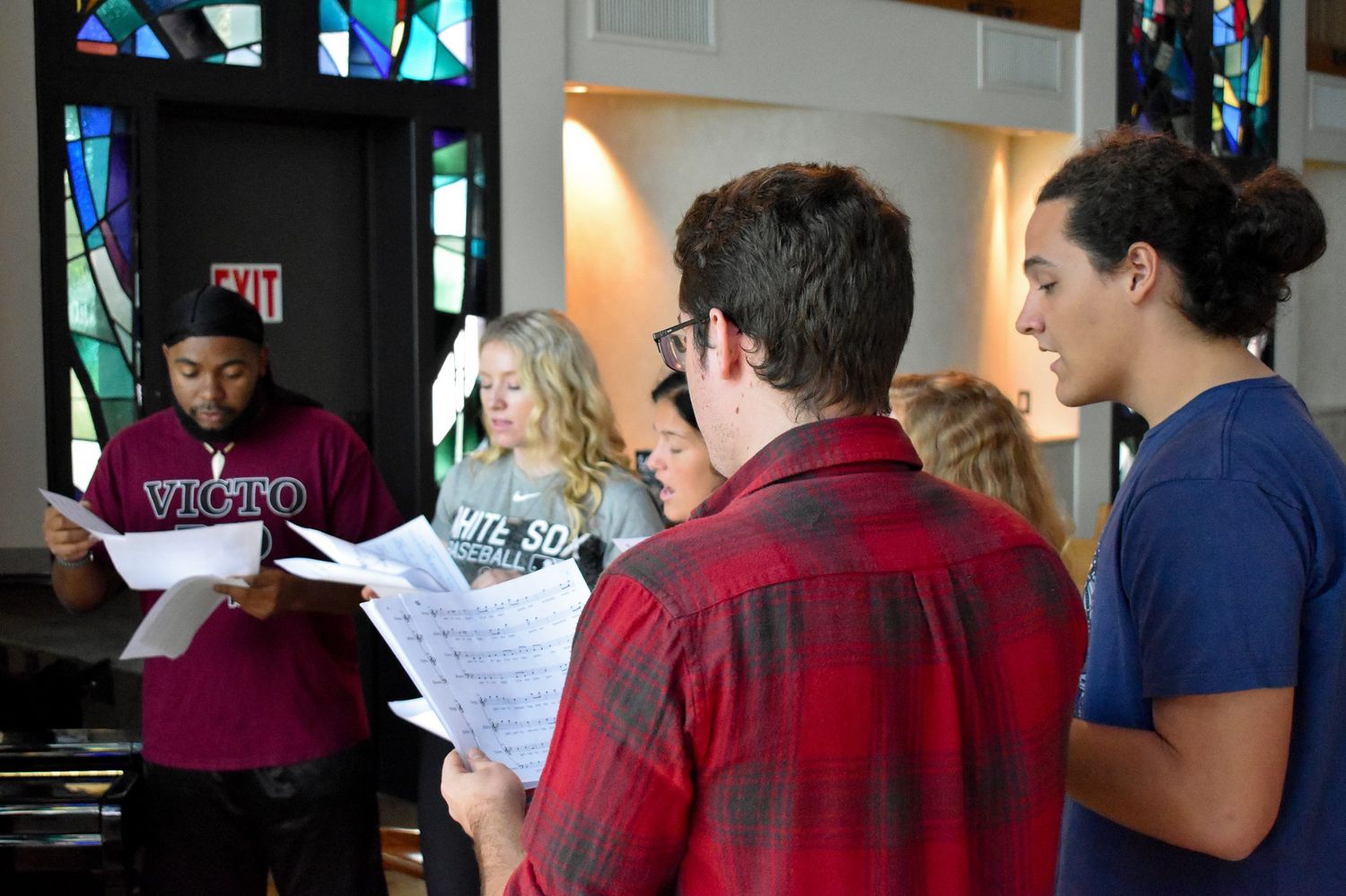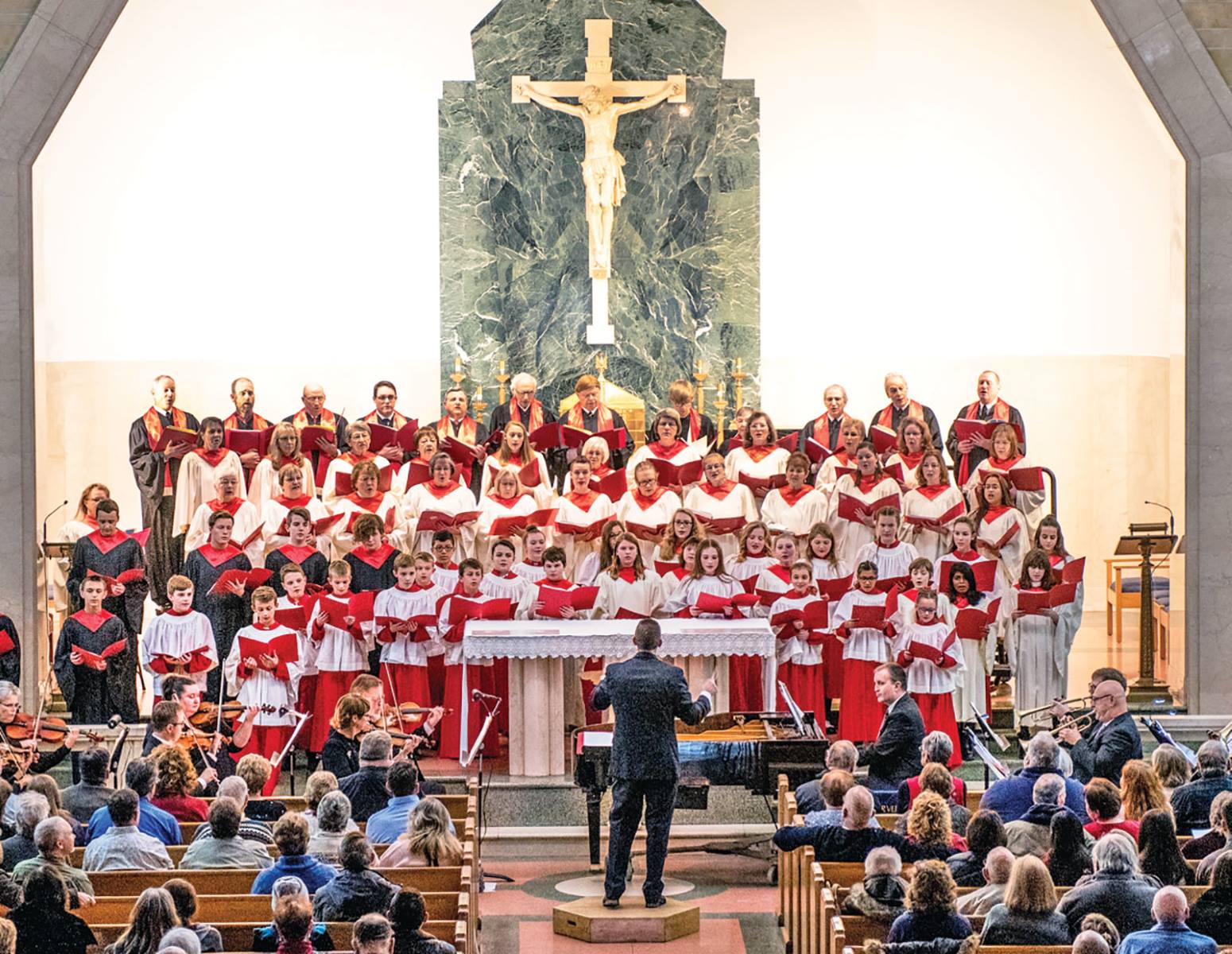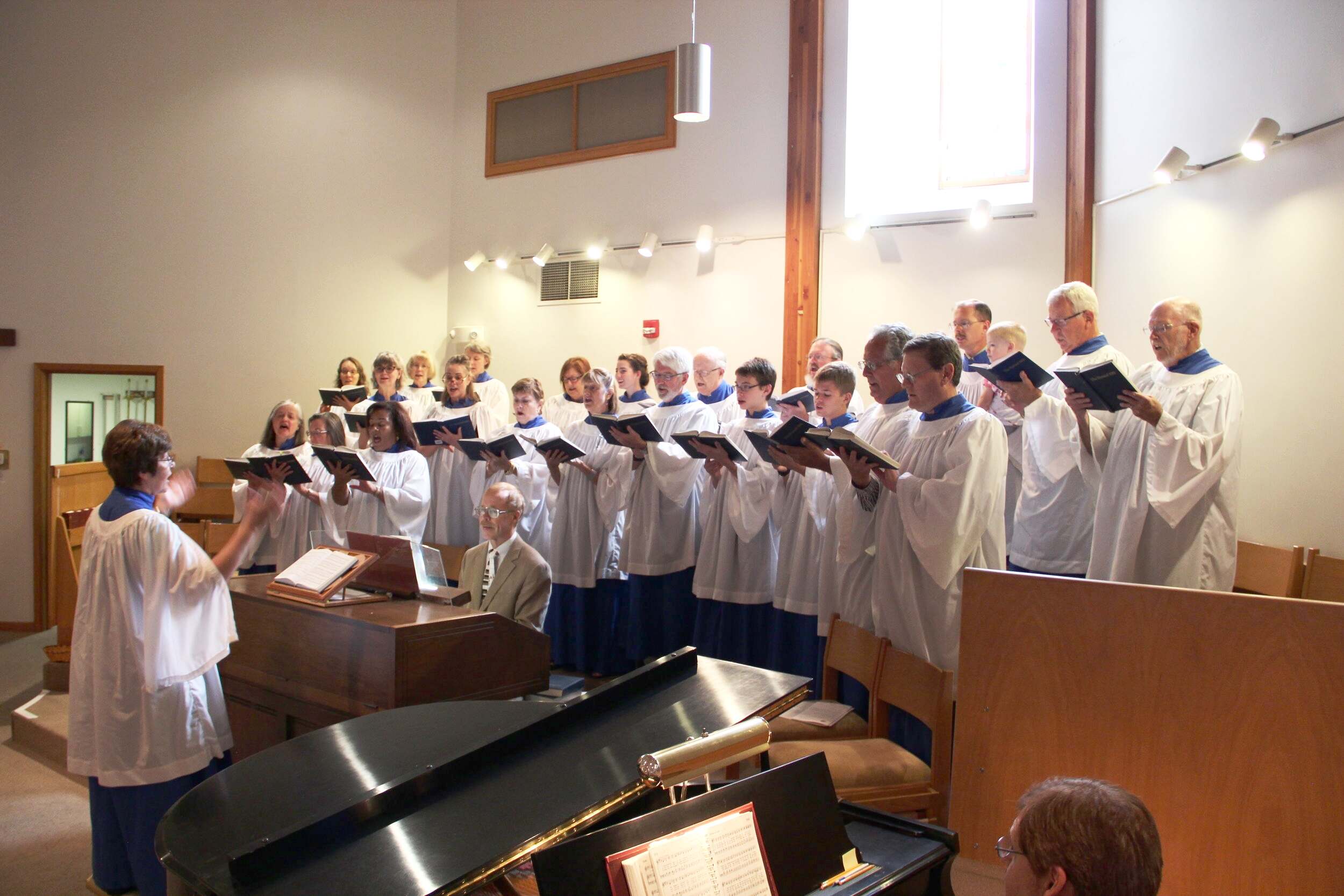Home>Events & Info>Acapella>Why Does The Church Of Christ Sing Acapella


Acapella
Why Does The Church Of Christ Sing Acapella
Published: January 4, 2024
Discover the rich tradition of acapella singing in the Church of Christ and learn why it holds such significance in worship.
(Many of the links in this article redirect to a specific reviewed product. Your purchase of these products through affiliate links helps to generate commission for AudioLover.com, at no extra cost. Learn more)
Table of Contents
Introduction
The use of acapella singing in the worship services of the Church of Christ is a topic that has sparked curiosity and discussion among believers and non-believers alike. In a world where musical accompaniment is the norm in many religious gatherings, the acapella tradition stands out as a unique aspect of worship in the Church of Christ.
The term “acapella” refers to singing without instrumental accompaniment. It comes from the Italian phrase “a cappella,” which means “in the manner of the chapel.” Acapella singing has a long history and is deeply rooted in various religious practices and traditions. However, the acapella tradition in the Church of Christ has its own distinct significance and reasons for its prominent role in worship.
This article aims to delve into the reasons behind the acapella tradition in the Church of Christ, exploring its historical background, the scriptural basis for its practice, and the theological arguments supporting this unique worship style. Additionally, we will examine the emphasis on congregational participation, the symbolic meaning behind acapella singing, and the historical practice within the Church of Christ.
By understanding the reasoning behind the use of acapella singing in the Church of Christ, we can gain a deeper appreciation for its significance and the impact it has on the worship experience of believers.
Historical Background
The acapella singing tradition in the Church of Christ can be traced back to its roots in the early Christian Church. During the first century, congregational singing without instrumental accompaniment was the norm. This practice continued for several centuries, namely in the Eastern Orthodox and Roman Catholic churches.
However, the use of musical instruments gradually became more prevalent in Western Christianity during the Middle Ages. This shift in worship style was met with resistance from certain groups who believed in a return to the simplicity and purity of early Christian practices, including acapella singing.
In the 16th century, the Protestant Reformation brought about a renewed focus on scripture and a desire to reform various aspects of Christian worship. This led to the emergence of different denominations, each with their own interpretations of how worship should be conducted. Some Protestant groups, including the Anabaptists and certain Puritan sects, rejected the use of instruments and advocated for acapella singing in their worship services.
The Restoration Movement in the early 19th century played a significant role in the development of the Church of Christ, particularly in the United States. This movement sought to restore the practices, teachings, and structure of the early Christian Church based on a strict interpretation of the New Testament. As a result, acapella singing became an integral part of the worship services in these congregations.
One of the key figures in the Restoration Movement was Alexander Campbell, who advocated for the simplicity and biblical accuracy of worship practices. Campbell believed that the New Testament provided the blueprint for worship, and since there was no mention of musical instruments in the early church, they should be excluded from worship in the present day.
Over time, the acapella tradition became deeply ingrained in the identity of the Church of Christ. Congregations began to see it as a distinctive characteristic that set them apart from other religious groups. Today, acapella singing continues to be a defining feature of worship in the Church of Christ worldwide.
Scriptural Basis
The practice of acapella singing in the Church of Christ is firmly rooted in a belief in the authority of scripture and the desire to follow the examples set forth in the New Testament. Advocates for acapella singing argue that the Bible does not provide any explicit instructions or examples of using musical instruments in worship, leading them to conclude that acapella singing is the proper and most scriptural form of worship.
One of the primary passages used to support this belief is found in Paul’s letter to the Ephesians, where he speaks of making “melody to the Lord with your hearts” (Ephesians 5:19). Proponents of acapella singing interpret this as a directive to use the instrument of the heart to express worship, emphasizing the spiritual aspect of music rather than physical accompaniment.
Another commonly cited scripture is found in Colossians 3:16, where Paul instructs believers to “teach and admonish one another with all wisdom through psalms, hymns, and songs from the Spirit.” Supporters of acapella singing argue that this passage specifically mentions vocal forms of music and excludes instrumental accompaniment.
Additionally, the acapella tradition aligns with the principles of simplicity and purity of worship found throughout the New Testament. Proponents argue that by adhering to acapella singing, they are preserving the simplicity of the early Christian Church and maintaining a pure form of worship free from the potential distractions or excesses associated with instrumental accompaniment.
While some may argue that there are references to musical instruments in the Old Testament, proponents of acapella singing maintain that the transition to the New Testament era brought about a change in worship practices. They assert that the absence of explicit instructions or examples of instrumental accompaniment in the New Testament serves as a guide for their worship traditions.
In summary, the scriptural basis for acapella singing in the Church of Christ lies in the belief that the New Testament does not provide explicit instructions for the use of instruments in worship. By emphasizing the use of the voice and the instruments of the heart, followers of acapella singing believe they are adhering to the scriptural principles of simplicity, purity, and worshipful expression as exemplified in the early Christian Church.
The Theological Argument
The acapella tradition in the Church of Christ is not merely a matter of preference or tradition; it is rooted in theological arguments that shape the worship practices of believers. The theological rationale behind acapella singing revolves around themes of reverence, spiritual engagement, and the priesthood of all believers.
Firstly, advocates of acapella singing argue that it fosters a sense of reverence and awe in worship. By eliminating instrumental accompaniment, the focus is shifted solely onto the voices of the congregation, creating a reverent atmosphere that allows for a deeper connection with God. The absence of instruments is believed to enhance the spiritual experience and encourage a more intimate and undistracted form of worship.
Secondly, the acapella tradition aligns with the belief in the priesthood of all believers. In the New Testament, believers are referred to as a “royal priesthood” (1 Peter 2:9), indicating that all believers have a direct relationship with God and are called to engage in worship and prayer. Acapella singing emphasizes congregational participation, providing an opportunity for every member to actively contribute and be part of the worship experience. This inclusive approach reinforces the belief that each member has a valuable role to play in expressing their devotion to God through song.
Furthermore, proponents of acapella singing argue that it helps to maintain the purity and authenticity of worship. By relying solely on the human voice, without the aid of instruments, the emphasis is placed on the content and message of the lyrics. This allows for a greater focus on the meaning and spiritual significance of the songs, encouraging worshippers to engage more deeply with the words and their personal connection to God.
Additionally, the acapella tradition is seen as a way to counteract the trend of entertainment-focused worship that can detract from the central purpose of worship. By removing instrumental accompaniment, acapella singing promotes a participatory approach, where the focus is on active engagement rather than passive observation. This helps to foster a worship culture that emphasizes spiritual growth and a genuine connection with God.
In summary, the theological argument supporting acapella singing in the Church of Christ emphasizes reverence, the priesthood of all believers, the preservation of purity in worship, and the promotion of an active and authentic worship experience. These theological underpinnings serve as the foundation for the continued practice of acapella singing in the worship services of the Church of Christ.
Emphasis on Congregational Participation
A key aspect of the acapella tradition in the Church of Christ is its emphasis on congregational participation in worship. Unlike styles that rely heavily on professional musicians or choirs, acapella singing encourages every member of the congregation to actively engage and contribute to the worship experience.
This emphasis on congregational participation is rooted in the belief that worship is not meant to be a passive observance but a communal expression of faith. By involving everyone in the act of singing, the Church of Christ seeks to create an atmosphere of unity and shared responsibility in worship.
One of the primary reasons for this emphasis on congregational participation is the belief in the priesthood of all believers. The Church of Christ teaches that each individual, regardless of their position or role within the church, has a direct relationship with God and is called to actively engage in worship and praise. Acapella singing provides an avenue for every member to contribute their voice and be an active participant in the worship service.
By encouraging congregational participation in song, the Church of Christ also promotes a sense of ownership and personal investment in worship. This idea is reflected in Paul’s writings to the early churches, where he encourages believers to “teach and admonish one another with all wisdom through psalms, hymns, and songs from the Spirit” (Colossians 3:16). Acapella singing allows for this mutual edification, with each member contributing their unique experiences and perspectives through song.
The inclusion of congregational participation in acapella singing also reflects the desire to create a worship environment that is accessible and inclusive to all. It removes barriers that might exist between performers and observers, ensuring that everyone has an equal opportunity to express their love and devotion to God through song. This egalitarian approach fosters a sense of unity and belonging within the congregation.
Furthermore, the act of congregational singing in the Church of Christ serves as a powerful form of communal prayer and praise. It allows for the collective voices of believers to merge and rise together, creating a harmonious expression of faith and worship. The blending of individual voices into a single melody symbolizes the unity and oneness of the body of Christ.
In summary, the emphasis on congregational participation in acapella singing is a central aspect of worship in the Church of Christ. It reflects the belief in the priesthood of all believers, fosters a sense of ownership and personal investment in worship, promotes inclusivity, and serves as a powerful form of communal prayer and praise.
Symbolic Meaning and Worshipful Experience
The acapella tradition in the Church of Christ carries a symbolic meaning that enriches the worship experience for believers. Beyond the absence of instrumental accompaniment, the acapella singing style holds deep significance in its symbolic representation and the connection it fosters between the worshippers and God.
One of the symbolic meanings associated with acapella singing is its emphasis on the spiritual aspect of worship. By solely using the human voice, the focus is shifted away from the physical and material, drawing worshippers towards a more profound and intimate connection with God. The absence of instruments serves as a reminder that worship is not about external showmanship or performance but about presenting a genuine and authentic offering of praise from the depths of one’s heart.
Additonally, acapella singing in the Church of Christ symbolizes the unity of the body of Christ. As believers raise their voices together in harmony, they embody the concept of oneness and unity found in the biblical teachings. This unified expression of worship creates a sense of community and shared purpose, strengthening the bonds between worshippers and reinforcing the belief in the power of communal worship.
Moreover, the simplicity of acapella singing enhances the worshipful experience for believers. The absence of instrumental accompaniment removes potential distractions and allows for a more focused and contemplative worship environment. This simplicity in worship style invites worshippers to engage in a deep and personal connection with God, unencumbered by any external distractions or excessive stimuli.
Another symbolic aspect of acapella singing lies in its reliance on the voice as the primary instrument of worship. The voice is uniquely personal and expressive, capable of conveying emotions, desires, and devotion. By using the voice as the primary means of musical expression, acapella singing allows for a greater range of individual interpretation and personal connection to the songs being sung. In turn, this deepens the worship experience and allows for a more profound expression of faith.
Furthermore, acapella singing in the Church of Christ reflects a commitment to authenticity and sincerity in worship. Without the aid of instruments, the focus is placed squarely on the words, melodies, and harmonies of the songs. This emphasis on the lyrical content and musical arrangements encourages worshippers to engage with the message being conveyed, enabling a more meaningful and worshipful experience.
In summary, the acapella tradition in the Church of Christ carries symbolic meaning that enhances the worship experience for believers. It emphasizes the spiritual aspect of worship, symbolizes unity, invites worshippers into a simple and contemplative environment, highlights the power of the voice as an instrument of worship, and promotes authenticity and sincerity in worship expression.
Historical Practice in the Church of Christ
The acapella tradition in the Church of Christ has a rich historical practice that spans centuries. From its roots in the early Christian Church to its continued prominence in modern-day worship, the Church of Christ has maintained a steadfast commitment to acapella singing as a fundamental part of its worship services.
Since the Restoration Movement in the early 19th century, acapella singing has been a defining characteristic of the Church of Christ. The movement sought to restore the practices and teachings of the early Christian Church based on a strict interpretation of the New Testament. As a result, instrumental accompaniment was deemed unnecessary and excluded from worship services.
Historically, the Church of Christ has relied heavily on hymns and psalms as the primary musical expressions of worship. These songs are typically characterized by their rich theological content, poetic lyrics, and melodic simplicity. Acapella singing allows for a focus on these lyrical treasures, enabling worshippers to engage deeply with the messages and themes conveyed in the songs.
Historically, the practice of acapella singing in the Church of Christ has also been a unifying factor among congregations. In the absence of musical instruments, the vocal harmonies and melodies created by the congregation create a sense of harmony and shared purpose. This emphasis on congregational participation and unity strengthens the bond between worshippers and fosters a sense of community in worship.
Furthermore, the historical practice of acapella singing in the Church of Christ reflects a commitment to musical authenticity and simplicity. By relying solely on the human voice, the worship experience is stripped of any potential distractions, allowing for a more intimate and genuine connection with God. This commitment to musical simplicity aligns with the desire to worship in spirit and truth, as emphasized in the New Testament.
In recent years, while many churches have adopted contemporary styles of worship, the Church of Christ has largely maintained its historical practice of acapella singing. However, it is worth noting that some churches within the Church of Christ have incorporated certain instrumental elements into their worship, which has led to variations in practice within the broader denomination.
In summary, the historical practice of acapella singing in the Church of Christ dates back to the early Christian Church and has been a central aspect of worship for centuries. The reliance on hymns and psalms, the emphasis on congregational participation and unity, the commitment to musical authenticity and simplicity, and the maintenance of historical traditions are all key elements of the historical practice of acapella singing in the Church of Christ.
Musical Simplicity and Authenticity
One of the distinguishing characteristics of acapella singing in the Church of Christ is its emphasis on musical simplicity and authenticity. This commitment to simplicity and authenticity in musical expression is deeply rooted in the desire to worship in a manner that is true to the teachings of the New Testament and to create an environment that allows for a genuine connection with God.
With acapella singing, the focus is primarily on the human voice as the instrument of worship. This simplicity of vocal music allows for a more intimate and personal experience, as the heartfelt expressions of praise and worship are conveyed through the natural timbre and nuances of the human voice alone. By eliminating the use of instrumental accompaniment, the congregation is able to engage in worship in a way that is stripped of any artificial embellishments, distractions, or unnecessary complexities.
The simplicity of acapella singing also encourages congregational participation. The absence of instruments levels the playing field and empowers every member of the congregation to actively contribute their voice in worship. This creates a sense of unity, as everyone is encouraged to join in collectively raising their voices to praise and glorify God.
Moreover, the commitment to musical authenticity in the Church of Christ is reflected in the choice of hymns and psalms as the primary source of musical expression. These songs, often rich in theological depth and lyrical meaning, have stood the test of time and have been sung by generations of believers. By preserving and singing these sacred hymns in their original form, the Church of Christ seeks to maintain a connection to its historical and spiritual roots.
The simplicity and authenticity of acapella singing also extends to the preservation of congregational traditions and practices. The Church of Christ has a strong sense of identity and heritage, and the adherence to acapella singing is a way of honoring and passing down the traditions and worship practices that have been held dear throughout the years.
Furthermore, acapella singing allows for a more intimate and genuine connection with the lyrics of songs being sung. Without the distraction of instrumental accompaniment, the congregation can fully immerse themselves in the lyrics, reflecting on their meaning and allowing the words to resonate deeply within their souls. This authentic engagement with the music and lyrics creates an atmosphere of worship that is both powerful and personal.
In summary, the emphasis on musical simplicity and authenticity in acapella singing in the Church of Christ reflects a commitment to worship in a manner that is true to the teachings of the New Testament. By prioritizing the voice as the primary instrument and embracing traditional hymns, the Church of Christ creates a worship experience that is focused on heartfelt expression, congregational participation, and a genuine connection with God.
Unity and Avoidance of Division
One of the core principles underlying the acapella tradition in the Church of Christ is the emphasis on unity and the avoidance of division. This commitment to unity can be seen through the use of acapella singing as it promotes a sense of togetherness and inclusivity among worshippers.
By exclusively using the human voice as the instrument of worship, the Church of Christ fosters a sense of unity among its members. Acapella singing allows everyone to participate in worship on an equal footing, without the distinctions that can sometimes arise from differences in musical ability or access to instruments. Regardless of background or skill level, all individuals can actively contribute to the worship experience, creating a shared sense of purpose and belonging.
In addition to promoting unity within the congregation, the acapella tradition in the Church of Christ also serves to unite believers across different congregations and even denominations. The common practice of acapella singing creates a bond among Church of Christ members regardless of geographical location or specific congregation affiliation. It allows for a sense of familiarity and shared experience when worshiping together, promoting a sense of community and connection within the larger body of Christ.
Furthermore, the avoidance of instrumental accompaniment in worship helps to prevent potential divisions or controversies that could arise from differing opinions on musical styles or preferences. By adhering to the simplicity of acapella singing, the Church of Christ seeks to minimize any potential distractions or sources of conflict that instrumental accompaniment could introduce.
The practice of acapella singing also aligns with the Church of Christ’s commitment to following the teachings of the New Testament. Since the New Testament does not provide explicit instructions or examples of using instruments in worship, the exclusion of instrumental accompaniment is seen as a way to maintain faithfulness to the biblical text. This adherence to a clear scriptural precedent helps to foster unity among believers who prioritize a strict interpretation of the New Testament in worship practices.
Additionally, the emphasis on unity in acapella singing extends beyond the immediate worship experience. It highlights the Church of Christ’s broader commitment to unity among Christians as a whole. The practice of acapella singing allows for a common ground of worship and praise that is not dependent on specific denominational or theological differences, but rather focuses on the shared faith in Christ.
In summary, the acapella tradition in the Church of Christ promotes unity among the congregation and helps to avoid potential divisions that can arise from differing musical preferences or interpretations. By prioritizing the human voice as the instrument of worship, the Church of Christ fosters a sense of togetherness and inclusivity among its members, as well as a broader unity within the larger body of Christ.
Conclusion
The acapella tradition in the Church of Christ holds a significant place in its worship practices. Rooted in historical, theological, and practical considerations, acapella singing has become a defining characteristic of the Church of Christ’s worship experience.
From its historical background to the scriptural basis, the practice of acapella singing in the Church of Christ has a firm foundation. It is not merely a stylistic choice but a reflection of deep-seated beliefs in the authority of scripture, the priesthood of all believers, and the desire for authentic and meaningful worship.
The acapella tradition emphasizes congregational participation, unity, and a worshipful experience. It encourages every member of the congregation to actively engage in worship, creating an inclusive environment where each voice contributes and helps to build a sense of community.
By prioritizing musical simplicity and authenticity, the Church of Christ seeks to create an environment that allows for a genuine and intimate connection with God. Through the absence of instrumental accompaniment, worshippers can focus on the depth and meaning of the lyrics, fostering a worship experience that is centered on the spirit and truth of worship.
The acapella tradition also promotes unity and helps to avoid divisions within the Church of Christ. By relying solely on the human voice, it eliminates potential sources of disagreement or controversy associated with musical preferences, fostering a sense of harmony and shared purpose among believers.
In conclusion, the acapella tradition in the Church of Christ is more than just a style of singing; it is a testament to the beliefs, values, and heritage of the Church. It enhances the worship experience by emphasizing congregational participation, unity, musical simplicity, and authenticity. By upholding this tradition, the Church of Christ continues to find meaning, spiritual connection, and a sense of identity in its worship practices.











